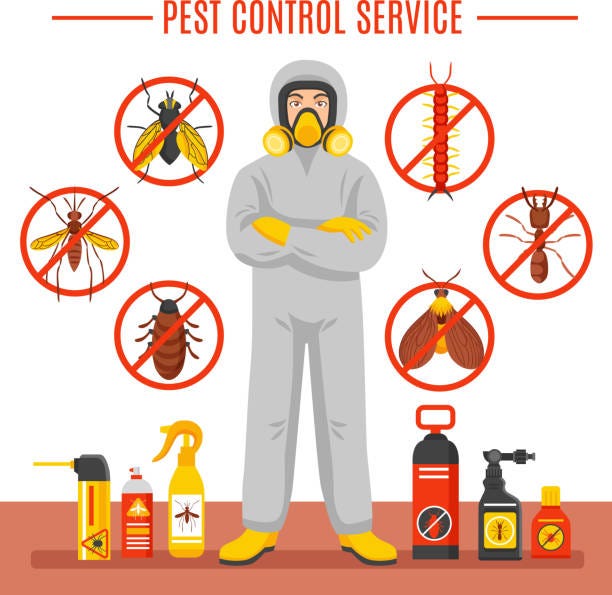a thorough Guide to the Different kinds of pest control management practices
Pest control management is an important part of preserving a healthier and livable environment, be it within domiciles, home gardens, or work environments. Using many pest control management practices readily available, it could be intimidating to find the most effective solution for a specific pest problem. From substance and biological ways to physical and normal alternatives, each strategy features its own distinctive talents and restrictions. Inside thorough tips guide, we shall check out these different types of pest control practices, supplying ideas to their applications and advantages. Towards the end, you'll have a clearer knowledge of which method will be the most readily useful complement your own pest control requirements. Very, let's dive inside fascinating world of pest control management and uncover the tips for a pest-free environment.
Chemical Pest Control Management Techniques

One typical types of substance pest control management is actually pesticides. Pesticides tend to be compounds that are specifically formulated to kill or repel pests. They may be applied in several kinds, such aerosols, baits, or dusts. Insecticides target particular pests, instance mosquitoes, termites, or ants, and can be used both indoors and in the open air.
A different type of substance pest control management is actually rodenticides. These are typically chemical compounds made to manage populations of rodents, including rats and rats. Rodenticides are generally found in bait type, which pulls the rats following kills them after ingestion. These are generally commonly used in farming options, as well as in domestic and commercial structures.
Weed killers, referred to as herbicides, are a different type of chemical pest control management approach. Herbicides are designed to precisely kill unwelcome plant life, referred to as weeds, without producing damage to attractive plant life. They've been widely used in agriculture, gardening, and gardening to manage the growth of undesired plant life.
While chemical pest control management methods are effective in removing pests, you should utilize them judiciously and follow safety instructions. Overuse or abuse of substance pesticides might have adverse impacts on real person health and environmental surroundings - Pest control near me. Thus, it is necessary to employ these methods responsibly and give consideration to alternate pest control management methods whenever possible
Biological Pest Control Techniques
Biological pest control techniques involve the employment of residing bacteria or organic chemicals to handle and get a handle on bug communities. Unlike substance strategies, which regularly use artificial pesticides or herbicides, biological control strategies make use of the all-natural enemies of pests to modify their unique communities. This method represents much more eco-friendly and lasting, since it reduces the use of harmful chemical substances and lessens the possibility of pesticide resistance.
One widely used biological pest control management strategy is the introduction of natural predators or parasitic organisms. Including, ladybugs tend to be introduced to regulate aphids, while specific wasp species tend to be revealed to focus on caterpillars. These predators and parasites prey on pests, reducing their own numbers and preventing infestations.
Another biological control technique is using pathogens. browse around here Some germs, trojans, and fungi can be used to contaminate and destroy certain bugs. As an example, the bacterium Bacillus thuringiensis is commonly always control caterpillars, because produces contaminants that are dangerous to these bugs.
Biological control practices may also entail making use of pheromones or natural materials that affect the mating patterns of pests. Pest look at these guys control near me. By preventing their unique copy, these methods make it possible to decrease pest communities in the long run
While biological pest control strategies are usually effective, they may need lengthier times to obtain desired effects compared to chemical techniques. Also, consideration must certanly be given to the selection and release of natural enemies to prevent unintended damage to helpful organisms or ecosystems.
Physical Pest Control Techniques
To properly control and manage pest communities, option pest control practices titled actual pest control practices are utilized. These methods include the usage of real barriers, barriers, or products to prevent bugs from accessing or harmful property. One typical bodily pest control management method is the utilization of displays or nets to help keep pests off structures or landscapes. These displays are typically made from fine mesh content which allows for air flow while preventing bugs from getting into. Another physical pest control technique is the installation of fences or wall space maintain larger bugs, including deer or rabbits, out-of gardens or agricultural industries. These obstacles physically block the pests' the means to access the region, reducing the prospect of damage. Moreover, barriers and gadgets can be used to capture or repel pests. Like, sticky barriers can be placed in areas where bugs tend to be difficulty, plus the bugs come to be trapped toward adhesive area. Ultrasonic units could also be used to produce high frequency noises that are unpleasant to insects, triggering these to keep place. Real pest control management practices tend to be an environmentally friendly substitute for chemical pesticides, as they never depend on using harmful chemicals.
Natural Pest Control Management Techniques
Normal pest control practices supply a sustainable and environmentally friendly approach to handling and reducing pests. These processes prioritize the aid of all-natural chemicals and biological agents, reducing the need for substance pesticides that can hurt the surroundings and human beings health. Probably the most typical normal pest control management techniques is actually biological control. This involves exposing normal predators or parasitic organisms to prey on or parasitize the bugs. For example, ladybugs in many cases are released to gardens to regulate aphid populations. Another normal technique is making use of repellents derived from plant life. Some plants, such as for example marigolds, lavender, and peppermint, emit scents that repel bugs like mosquitoes, flies, and ants. Moreover, cultural control methods can be used to avoid and manage pest infestations. This may involve right sanitation, standard upkeep, and advertising biodiversity in yard. For example, rotating crops, getting rid of garden dust, and stimulating organic predators can help avoid the buildup of bugs. By implementing these organic pest control management strategies, people and communities can properly control bugs while minimizing the bad influences on ecosystem and person wellness.
Built-in Pest Control (IPM)
Incorporated Pest administration (IPM) is a thorough and methodical way the original source of pest control that mixes different methods and techniques to effectively handle bugs while minimizing making use of chemical pesticides. IPM is designed to keep bug communities below the financial harm amount through the use of a mix of social, biological, and chemical control practices.
Social control methods include modifying the environmental surroundings making it much less advantageous for pests. This can feature methods for example harvest rotation, right sanitation, plus the using resistant plant types. By generating bad circumstances for pests, cultural control strategies can considerably minimize bug populations.
Biological control techniques include making use of natural enemies, like predators, parasitic organisms, and pathogens, to manage pests. These organic opponents assist regulate pest populations by giving on or infecting all of them. By presenting and improving communities of beneficial organisms, biological control techniques can properly reduce insects.
Chemical control methods are utilized as a last vacation resort in IPM. They involve the targeted and judicious usage of pesticides or herbicides to control bug communities. Unlike main-stream pest control management practices, IPM is designed to minmise the usage substance pesticides or herbicides by using alternate techniques.

Bottom Line
To conclude, this article has furnished a thorough summary of the different kinds of pest control management techniques. It mentioned chemical, biological, physical, and normal pest control management methods, in addition to the integrated pest control approach. By understanding these numerous practices, individuals will make updated decisions where pest control management technique is the most suitable due to their specific needs and choices. Powerful pest control management is crucial in keeping a healthier and pest-free planet.